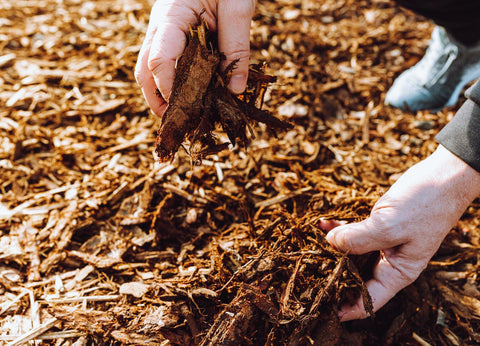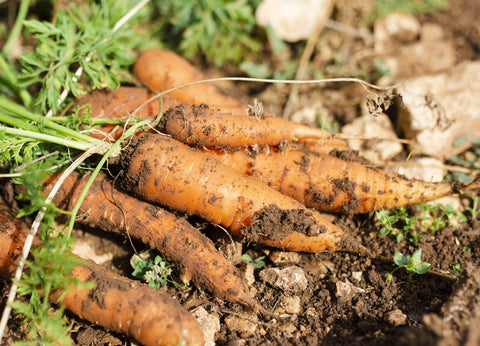The Benefits of Using Composted Bark Mulch in Your Garden

Incorporating composted bark mulch into your garden is a wonderful way to improve both its aesthetic appeal and the overall health of your garden. It can enhance soil quality, feed plants, shield them from temperature fluctuations and prevent weed growth by utilising composted bark mulch. Bark mulch improves garden aesthetics and has many benefits. Great for any size garden. Learn the benefits of composted bark mulch for your garden and get helpful tips on using and storing it in large quantities.
What is Composted Bark Mulch?
Composted Bark Mulch is a natural and organic material that is made by breaking down bark through the composting process. After shredding the bark into small pieces, it is left to decompose in a compost pile. This process helps to break down the bark into a rich, dark material that is full of nutrients. Composted Bark Mulch is available in different forms such as compost bark chippings, compost bark mix, and compost bark dust. Supplementing nutrients to the soil is a highly effective method of improving its quality and promoting plant health. You can easily find composted bark near me or online in bulk bags.

Benefits of Using Composted Bark Mulch:
Using composted bark mulch in your garden offers numerous benefits for your plants and soil.
Firstly, composted bark mulch acts as a natural weed suppressant. By creating a thick layer of mulch around your plants, you prevent sunlight from reaching weed seeds, thus inhibiting their germination and growth. This means less time and effort spent on weeding and more time enjoying your garden.
Additionally, composted bark mulch helps retain soil moisture. The mulch acts as a barrier, reducing evaporation and preventing water runoff. This is especially beneficial during hot summer months when water conservation is crucial. Your plants will remain well-watered and healthy, even during drought periods. Furthermore, composted bark mulch improves soil quality. As the mulch breaks down, it adds organic matter to the soil, enhancing its fertility and structure. This is especially beneficial for clay soils, as composted bark helps to loosen compacted soil, allowing for better root penetration and nutrient absorption.
Lastly, composted bark mulch acts as insulation for your plants' roots. It helps regulate soil temperature, keeping the roots cool in the summer and protecting them from freezing during the winter. This is particularly advantageous for delicate plants, such as orchids, which require a stable root environment. Whether you're looking for composted bark mulch near you or considering a multi-buy option, incorporating this organic material into your garden is a wise choice. With its weed-suppressing abilities, water conservation properties, soil-enhancing benefits, and root insulation advantages, composted bark mulch is a valuable asset for any gardener. When seeking the most suitable bark mulch for your garden, composted bark is a highly recommended option to explore. Choosing this type of mulch not only promotes environmental well-being but also cultivates a sustainable mindset. Composted bark mulch is produced by decomposing and ageing bark and wood to yield an organic substance that is rich in nutrients.
If you have clay soil, composted bark for clay soil is an ideal choice as it can help improve drainage and soil aeration. Bark mulch helps decompose clay particles, improving water and airflow in soil. Applying composted bark mulch in your garden is a hassle-free task. Just follow some straightforward steps to ensure its effective application.
When applying composted bark mulch, make sure to spread it evenly around your plants and avoid creating thick piles against the stems. A layer of 2-3 inches is typically recommended, although this can vary depending on the type of plants you're growing and the climate in your region.
How to Apply Composted Bark Mulch:
Once you've decided to incorporate composted bark mulch into your garden, the next step is to become well-versed in how to apply it effectively. The process is fairly straightforward and can be done in a few simple steps.
First, prepare the area where you'll be applying the mulch. Remove any weeds or grass from the soil and ensure the surface is level. This will help the mulch to stay in place and provide maximum coverage.
Next, spread a layer of composted bark mulch over the desired area. Aim for a thickness of around 2-3 inches. This will help to suppress weeds, retain moisture in the soil, and regulate temperature.
To prevent rot and fungal diseases, it's important to keep the mulch a few inches away from the base of your plants. Leaving a small gap will also allow water and air to reach the roots.
If you have clay soil, you can mix in some composted bark to improve drainage and prevent waterlogging. Implementing this is essential to create a favourable environment for your plants to thrive.
Remember to replenish the mulch as needed, especially as it breaks down over time. A fresh layer every year or so will ensure that your plants continue to receive the benefits of composted bark mulch.
By following these steps, you'll be able to successfully apply composted bark mulch in your garden. Improve your garden's health and beauty with this eco-friendly option for ornamental plants and vegetable beds.

When to Use Composted Bark Mulch:
Composted Bark Mulch is an excellent option for mulching your garden at any time of the year. It can help regulate soil temperature, retain moisture, and suppress weed growth, providing a protective layer for your plants. Additionally, if you're dealing with clay soil, adding composted bark for plants can improve its texture and drainage. Remember to avoid using bark compost for orchids as they require specialised soil and mulch.
- James Beesley
